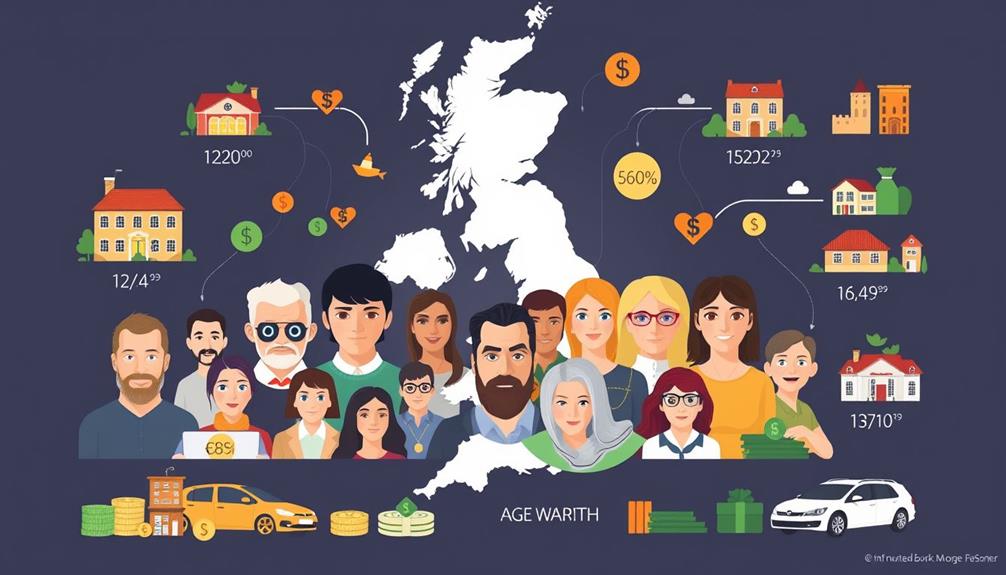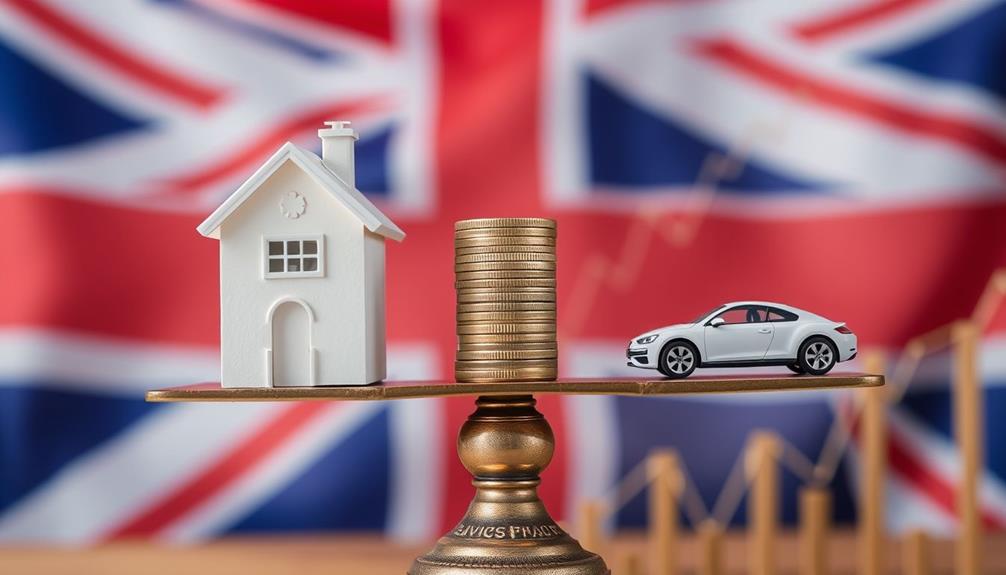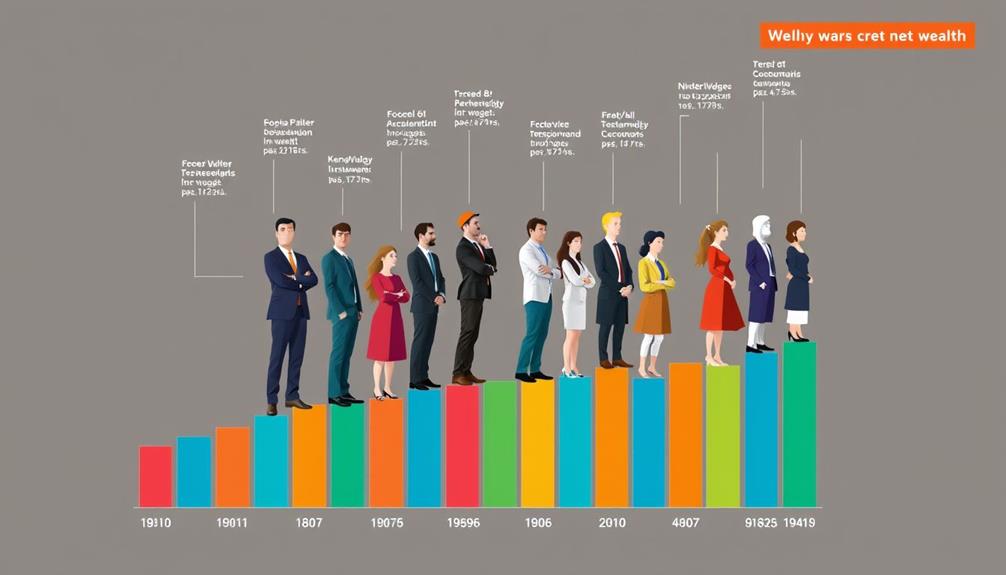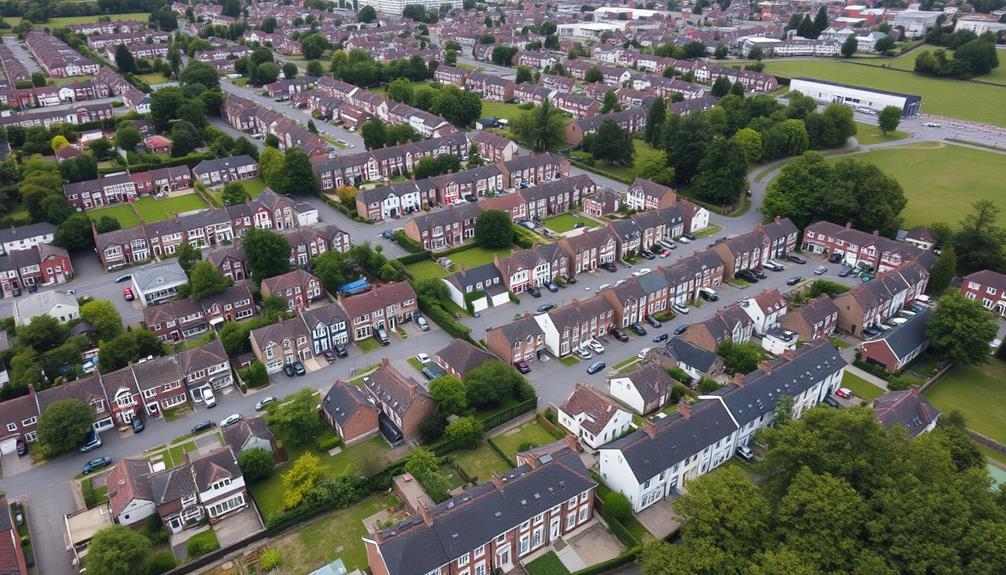The average net worth in the UK stands at about £437,685, thanks to rising property values. This average hides some stark contrasts. The top 10% of households boast an average net worth of around £1.4 million, while the bottom 10% struggle with less than £10,600. Many factors influence your net worth, including age, property ownership, and socio-economic status. If you're curious about where you fit into this financial landscape or how to improve your standing, there's much more to explore about building your wealth and achieving financial security. For example, younger individuals may have lower net worth due to less time to accumulate assets, while older individuals may have higher net worth due to increased savings and investments. Property ownership can also significantly impact net worth, with homeowners often having much higher net worth than renters. Socio-economic status also plays a role, as individuals with higher incomes and access to financial resources tend to have higher net worth.
If you’re interested in learning more about how to improve your financial standing and increase your net worth, consider seeking professional financial advice or exploring resources on wealth building strategies. Additionally, you can also explore examples of successful individuals, such as “james best actor net worth,” to gain insights into how they have achieved financial success and built their wealth.
Key Takeaways
- The average net worth in the UK as of 2021 is approximately £437,685, reflecting a 7.6% increase from the previous year.
- The top 10% of households have an average net worth of about £1.4 million, highlighting significant wealth disparity.
- Land and property assets account for over 60% of total household net worth, emphasizing the importance of property ownership.
- Younger individuals, aged 16-24, have an average net worth of £20,400, primarily in physical assets, indicating financial challenges.
- Average household savings for the top 10% is around £215,700, while the bottom 10% struggle with savings of less than £100.
Overview of Net Worth in the UK
When you look at the average net worth in the UK, it's clear that households have seen notable growth over recent years. As of 2021, the average net worth reached approximately £437,685, which marks a substantial increase from previous years. This growth is largely driven by rising average house prices, which increased by 8.3% in the same year.
Understanding the significance of budgeting effectively can also contribute to improving personal financial situations, allowing households to manage their assets better. Land and property assets play a pivotal role in this increase, accounting for over 60% of the total net worth in the UK. This means that if you own property, your net worth could be considerably higher than if you don't.
However, it's crucial to acknowledge the stark wealth inequality in the country; the top 10% of households enjoy an average net worth much higher than that of the bottom 10%.
While the corporate sector has shown strong asset accumulation, the general government's net worth remains in the negative, sitting at £1.4 trillion.
Average Household Net Worth

When it comes to average household net worth in the UK, you'll see some striking figures. In 2021, the average household net worth hit £437,685, largely thanks to rising property values.
It's important to take into account that financial security can also be enhanced through diversification of investments, like precious metals, which serve as a hedge against inflation and economic uncertainty investment strategies in precious metals.
However, wealth distribution varies greatly, with the top 10% holding a significant portion of that wealth while many households own no property at all.
Current Net Worth Figures
As of 2021, the average household net worth in the UK stands at approximately £437,685, showcasing a remarkable accumulation of wealth over the years. These current net worth figures reflect a significant 7.6% increase from the previous year, largely driven by rising average house prices, which rose by 8.3%.
The rise in wealth among households may also encourage individuals to contemplate investment strategies in precious metals as a means of diversification. Land and property assets play a critical role in boosting households' net worth, with land accounting for over half the growth noted in 2021. This increase highlights how fundamental real estate is for building wealth among UK households.
However, it's important to acknowledge that the distribution of this wealth varies widely. While the top 10% of households boast an average net worth of around £1.2 million, the bottom 10% struggle with less than £10,000.
Wealth Distribution Among Households
Wealth distribution among households in the UK reveals significant disparities that can impact financial planning and investment decisions. Understanding where you stand compared to others can guide your financial strategies effectively. Here are some key points to take into account:
- The average household net worth in the UK reached £437,685 in 2021.
- Land and pensions make up 69.2% of this average household net worth.
- The top 10% of households average a staggering £1.4 million in net worth, with many investing in options like a Gold IRA for better wealth preservation.
- In contrast, the bottom 10% of households average just £10,600.
- Over one-third (33%) of households hold no property wealth at all.
This wealth distribution highlights a pronounced concentration of wealth among certain households, which can skew perceptions of financial health.
With such stark differences, it's crucial to evaluate your own financial situation and reflect on the impact of these disparities on your investments.
The contrast between household wealth and the negative net worth of the general government (£1.4 trillion) also emphasizes the unique dynamics of wealth distribution in the UK.
Understanding this landscape can help you make more informed financial decisions.
Factors Influencing Net Worth
Several key factors influence the average household net worth in the UK, shaping how families accumulate and manage their assets. One major contributor is land and property, which account for over 60% of total household wealth. As property values rise, so does your net worth; in 2021, average house prices increased by 8.3%, greatly boosting overall household assets and contributing to a net worth growth of 7.6%.
Additionally, diversifying investments through options like gold IRAs can provide a hedge against economic downturns, enhancing overall portfolio resilience as well Gold IRA benefits.
The revision of household net worth, up by £0.5 trillion to £12.3 trillion, reflects enhanced measurement methods that capture wealth more accurately. However, it's crucial to recognize that wealth distribution varies widely. The top 10% of households control a disproportionately higher net worth compared to the bottom 10%.
This disparity in asset accumulation highlights the impact of various socio-economic factors, such as income levels, education, and investment strategies.
Ultimately, your net worth is influenced by how effectively you manage your assets and navigate the property market. By understanding these factors, you can better assess your financial position and strategize for future growth.
Net Worth by Age Groups

When you look at net worth by age groups, you'll notice a stark contrast between young adults and those in midlife.
While individuals aged 16-24 typically hold around £20,400, those aged 35-44 see their net worth jump to about £146,000 as they accumulate wealth through property and higher incomes.
This significant growth highlights the financial challenges younger generations face compared to their older counterparts.
Additionally, the increasing focus on sustainability and responsible investing may influence the financial decisions of younger adults as they endeavor to build their wealth in a conscientious manner.
Young Adults' Net Worth
Young adults in the UK experience a notable increase in net worth as they shift through their twenties and thirties. If you're between 16 and 24, your average net worth sits at £20,400, mainly tied up in physical assets. This growth can also be influenced by various factors, including key domains of development in psychology, which highlight how financial literacy and decision-making evolve over time.
However, as you enter the 25-34 age group, that average jumps to £57,300, thanks in part to property investments.
Here are some key points about young adults' net worth:
- Average net worth for 16-24: £20,400
- Average net worth for 25-34: £57,300
- Property value for 25-34: £12,000
- Net worth increase from 16-24 to 25-34: 180%
- Average net worth for 35-44: £146,000
This significant growth reflects the opportunities that arise as you gain work experience and invest in assets.
While most young adults haven't yet entered the property market, those who do find that their net worth climbs quickly.
Midlife Wealth Growth
Midlife wealth growth is often marked by substantial increases in net worth as you navigate through your 30s, 40s, and 50s. If you're in the 35-44 age group, you can expect average net worth figures around £146,000. This reflects how your career advancements and asset accumulation contribute to your financial standing.
Diversifying investments, including options like gold IRAs, can also enhance your financial security during this phase gold investment strategies. As you enter your 45-54 years, your net worth typically rises to approximately £243,900, showcasing the influence of higher incomes and property ownership.
By the time you reach the 55-67 age group, your average net worth can soar to about £393,400. This significant increase is largely due to property value appreciation and the savings you've built over time.
The wealth distribution among these age groups indicates that midlife individuals usually experience notable asset appreciation, especially in real estate and pension contributions.
Components of Net Worth

Understanding the components of net worth is essential for grasping the overall economic landscape of the UK. Your net worth is influenced by various factors, and breaking it down can help you understand your financial position better. For instance, financial considerations for elderly care, such as assisted living expenses, can impact one's financial assets.
Here are the key components:
- Financial Assets: This includes loans, deposits, and investments.
- Non-Financial Assets: Primarily land and buildings, which account for over 60% of the UK's total net worth.
- Liabilities: Debts that can outweigh your financial assets, leading to negative net worth.
- Household Wealth: The average household net worth, which reached £437,685 in 2021, varies greatly among households.
- Market Trends: Changes in property values and land appreciation greatly impact your net worth.
In the UK, financial net worth has been negative since 2017, with liabilities exceeding financial assets by £424.2 billion in 2021.
However, household net worth increased by 7.6% in 2021, largely driven by rising property values. Understanding these components can help you assess your own financial health and make informed decisions moving forward.
Financial Health Indicators

Financial health indicators provide a clearer picture of the economic well-being of households across the UK. They reveal the disparities in net worth and highlight the challenges many face. For instance, the average household net worth reached £437,685 in 2021, but this figure masks significant inequality.
Here's a breakdown of net worth and income by household percentile:
| Household Percentile | Average Net Worth | Average Disposable Income |
|---|---|---|
| Top 10% | £1.5 million | £70,900 |
| 2nd Decile | £650,000 | £45,000 |
| Middle 60% | £200,000 | £30,000 |
| 2nd Lowest Decile | £25,000 | £15,000 |
| Bottom 10% | £8,900 | £10,600 |
These indicators show that financial net worth has been negative since 2017, which raises concerns about growing liabilities. Additionally, land assets make up over 60% of the UK's total net worth, underscoring real estate's role in household wealth. Understanding these indicators helps you assess your financial health in relation to others.
Wealth Distribution Insights

Examining wealth distribution in the UK reveals stark contrasts that shape the economic landscape. Your understanding of these disparities can provide valuable wealth distribution insights, helping you gauge your financial position relative to others.
Additionally, adopting an abundance mindset can play an essential role in how you perceive your financial status and potential for growth.
- The average household net worth reached £437,685 in 2021.
- Land constitutes over 60% of total household assets owned.
- The top 10% of households earn an average disposable income of £70,900 annually.
- The bottom 10% only see around £10,600 in disposable income.
- Approximately 33% of UK households lack any property wealth.
These figures highlight the unequal access to wealth and property in the UK. While older demographics, especially those aged 55-67, showcase an average net worth of £393,400, younger individuals typically hold notably less.
The concentration of wealth in the hands of a few underscores the growing divide in financial stability. Understanding how assets owned, such as property, influence net worth can help you strategize for a more secure financial future.
Impact of Property Ownership

Property ownership plays an essential role in determining your net worth in the UK. As of 2021, land accounted for over 60% of total household net worth, making it a cornerstone of property wealth for many.
If you're among the 33% of households with no property wealth, you might feel the impact of this trend more acutely. The average property wealth for the top 10% of households is a staggering £480,000, underscoring the disparity in wealth accumulation.
In recent years, rising house prices have greatly boosted overall household net worth. In 2021, average house prices increased by 8.3%, leading to a 7.6% rise in net worth across households.
If you own property, you likely belong to the 35-44 age group, where average net worth climbs to around £146,000, largely fueled by property appreciation.
This distinction between net property wealth and overall wealth emphasizes how real estate acts as a key asset for financial stability and growth. By investing in property, you not only build equity but also enhance your financial security, making property ownership an essential factor in your net worth.
Savings Trends and Analysis

Savings trends in the UK reveal significant disparities between households, particularly when comparing the top and bottom earners. The average equivalised savings for the top 10% of households sits around £215,700, while the bottom 10% struggle with less than £100. This stark contrast highlights the challenges lower-income households face in building financial resilience through savings accounts.
- Higher-income households enjoy substantial savings.
- Access to easy-to-use savings accounts is essential.
- In 2021, net worth rose by 7.6%, driven by property.
- Pensions make up 29.7% of average household net worth.
- Asset accumulation plays a key role in savings trends.
As you navigate your financial journey, understanding these trends can be important for your planning. The data shows that easy-to-access wealth, such as funds in bank accounts and ISAs, is critical for managing immediate spending needs.
The overall trend points to a growing wealth gap, indicating the importance of focusing on long-term savings strategies to enhance your financial health. By examining these savings trends, you can better position yourself to achieve your financial goals.
Tools for Financial Comparison

Understanding your financial standing is essential, and various tools can help you do just that. One of the most effective tools available is the Wealth Calculator. This tool allows you to assess your worth by comparing your financial situation across multiple measures, including income, spending, and property wealth. Importantly, it doesn't retain your personal data, ensuring your privacy.
You might find it eye-opening to see how your finances stack up against the averages. For instance, the top 10% of UK households boast an average income of £70,900 per year, while the bottom tier earns just £10,600.
When it comes to savings, the disparities are stark; the wealthiest average £215,700 in savings, contrasting sharply with less than £100 for those in the lower bracket.
Additionally, property wealth can greatly impact your overall net worth. The top 10% owns property worth an average of £480,000, while a third of households have no property wealth at all.
Conclusion
In the grand tapestry of the UK's financial landscape, understanding your net worth weaves an essential thread. As you navigate the intricate pathways of wealth, remember that every pound counts, and your financial journey is uniquely yours. By comparing your standing against the national average, you can illuminate your progress and set your sights on future goals. Embrace the numbers, for they're not just figures; they're milestones on the road to financial prosperity. By assessing where you stand, whether above or below benchmarks, you gain clarity to make informed decisions about your financial future. For instance, having a net worth of $6 million places you in an exclusive tier, highlighting achievements that often reflect years of dedication, strategic planning, and smart investments. Let these milestones inspire you to refine your strategies and maintain a vision of long-term financial security.










